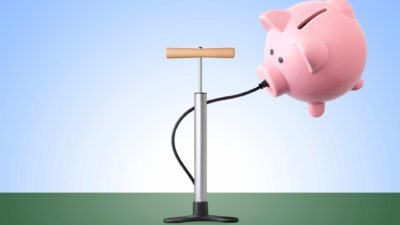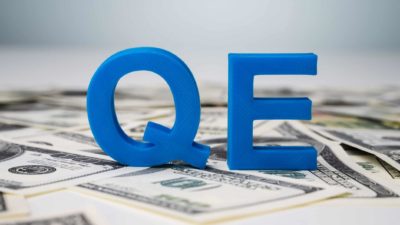Talk of the 'next recession' has been hot this year.
Whilst there is no set timeframe for recessions to take place, the gyrations of Brexit and the US–China trade war combined with the mere fact the world hasn't seen a global downturn in over 10 years now have started to make investors wary. This is for good reason – the US is now in its longest bull-market in history and when America sneezes, the rest of the world tends to catch the cold (as the saying goes).
Still, I'm not trying to predict when the next downturn will hit, but I do think we are in a place in the business cycle that warrants caution about what the near future might hold.
What is a recession?
A recession is technically defined as two consecutive quarters of negative GDP growth – but this isn't always black and white. Most people would say Australia suffered a mild recession in 2008/09 during the GFC, despite the official definition of a recession not being met.
In a recession, the economy basically contracts, and this has many negative effects. Unemployment rates often rise, as do government welfare recipients. In the private sector, most companies are able to sell less goods and services, and so profits and earnings typically take a hit (this is why recessions are usually accompanied by a stock market crash).
Which ASX shares would be at most risk from a recession?
Well, I'm going to divide stocks into three broad camps in order of vulnerability to a recession. Here's what I came up with:
1. Safer Stocks
Whilst no company can be 100% safe in a recession, these are the companies with the least inelastic earnings – meaning a recession is not likely to hurt them too badly. These typically include infrastructure companies like APA Group Ltd (ASX: APA), Sydney Airport Holdings Pty Ltd (ASX: SYD) and Transurban Group (ASX: TCL). These companies are monopolistic providers of essential services, and therefore have very little chance of said services experiencing a massive drop in demand. Take APA – chances are people living on the east coast of Australia won't turn off their cooking gas if times get tough.
Utility companies like AGL Energy Ltd (ASX: AGL), Origin Energy Ltd (ASX: ORG) and Telstra Corporation Ltd (ASX: TLS) also fall into this category. Electricity use might experience some ups and downs over the business cycle, but its use is never going to stop being needed, regardless of the economic weather. Likewise with internet – in this modern age, it's difficult to imagine how bad things would have to get before people stop paying their phone bills and giving up their smartphones and social media presences.
Consumer staples stocks like Coca-Cola Amatil Ltd (ASX: CCL), Woolworths Group Ltd (ASX: WOW) and Coles Group Ltd (ASX: COL) are another group that are well-insulated from a recession. We all have to eat, drink and buy toothpaste and soap at the end of the day – and most of us will keep buying Cokes and going to Coles or Woolies to do so, in good times and bad.
If you're thinking about switching your entire portfolio to these 'safe' stocks, it's not that easy. A combination of low interest rates and fears about an upcoming recession have already pushed many of these companies to high valuation levels. For example, Transurban is currently trading for a share price that's over 200x the company's earnings.
If capital preservation and high dividend income is important for your portfolio, by all means stick with these kinds of companies, but keep in mind high prices can destroy returns over the long run.
2. Moderate Stocks
So in the 'moderate' category, we have stocks that will likely see a hit to earnings, but through diverse earnings streams or a wide economic moat (or competitive advantage) should be able to bounce back quite easily, with little long-term capital loss for shareholders.
In this category, I would place large conglomerates like Wesfarmers Ltd (ASX: WES), which has a huge range of businesses (including Bunnings, Target, Kmart and Kleenheat Gas) that should keep things afloat in tough times.
Washington H. Soul Pattinson & Co. Ltd (ASX: SOL) is also another highly diversified business that would likely come out of a recession with minimal damage.
I would also nominate the big ASX banks like Commonwealth Bank of Australia (ASX: CBA) and Westpac Banking Corp (ASX: WBC). Although banks would be hit hard – our 'big four' have such huge size and scale (and benefit from government guarantees and protections) that their long-term profitability would remain sound.
A final note would be high-quality healthcare stocks like CSL Limited (ASX: CSL), Ramsay Health Care Limited (ASX: RHC) and Medibank Private Ltd (ASX: MPL). Again, these companies might experience a short-term dip in earnings, but at the end of the day healthcare is a necessity that is essential in good times and bad and most people won't stop using these companies' products and services.
3. Risky Stocks
Our last category and the most dangerous to hold in a recession. Here we have companies that would likely take a big hit during a recession and may even risk long-term damage if things get really ugly.
I'm throwing in retail stocks first – things like Myer Holdings Ltd (ASX: MYR), Harvey Norman Holdings Limited (ASX: HVN) and JB Hi-Fi Ltd (ASX: JBH). Although many retailers are all well-run, high quality businesses, the industry they operate in is just simply vulnerable to people closing their wallets. If someone in a household loses their job, very few people would subsequently go ahead and buy a new TV or outfit.
Another area to watch out for is growth stocks – especially those companies that don't yet turn a profit. Many growth stocks' share prices have become detached from their companies' fundamentals in recent years – I'm especially thinking of the WAAAX stocks like Afterpay Touch Group Ltd (ASX: APT). This is suddenly obvious in a stock market crash, and you will typically see growth stocks get hit worse in a bear market.
The last group of stocks that a recession would be highly damaging to are resource companies. In a recession, the prices of most commodities go through the floor, which means that the companies that extract them make significantly less money. As an example, during the GFC shares of Rio Tinto Ltd (ASX: RIO) went from over $155 per share to around $32 a share in about 6 months.
Foolish takeaway
I hope this breakdown of what could happen in a recession has been helpful. Whilst we shouldn't try and time the market and trade in and out of 'risky' business, I think understanding what might happen to certain stocks in your portfolio in a recession is highly beneficial. Recessions and movements in the business cycle are a natural part of investing and give us the opportunity to buy many good businesses at cheap prices – nothing more.







